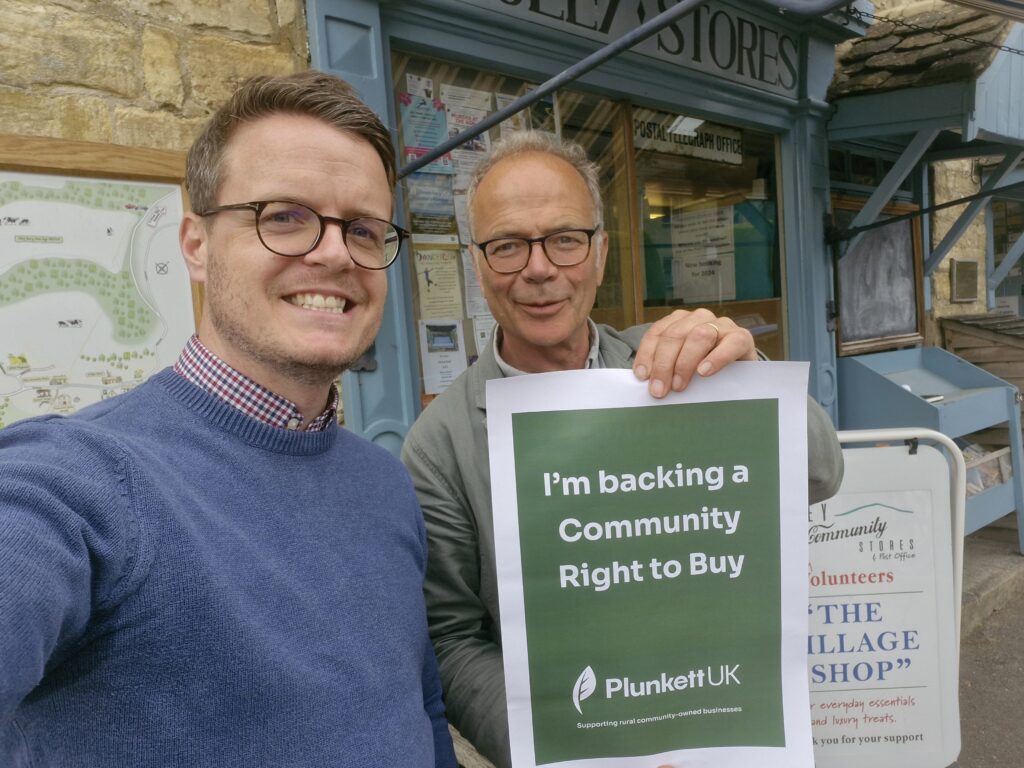Chris Cowcher, Head of Policy and Communications, considers how the legislative programme for Government included in the King’s Speech might impact our sector.
Just over a week ago we saw the State Opening of Parliament with a Labour Government incumbent for the first time in 15 years. As King Charles sat and delivered his King’s Speech, setting out the programme of legislation and ‘Change’ promised by Sir Kier Starmer and co. in the lead up to the election, it was hard not to be caught up in the significance of the moment.
Whilst we already knew there would be an element of continuity, to provide stability in these earliest days in office I was personally looking out for what could have an impact on the growing number of community-owned businesses across the UK. With a pledge to grow the size of the cooperative and mutuals sector being at the heart of the Labour manifesto, I was keen to see what new policies might be on offer to super charge our movement.

Chris Cowcher with newly elected Labour MP for Stroud, Dr Simon Orpher at Uley Community Shop.
As we listened to what a ‘Mission-driven Government’ would mean for the country, it was clear from the outset that the previously trailed ‘fiscal responsibility,’ that had been repeatedly referenced by Rachel Reeves and team in the past, would be fully adhered to. If something hadn’t been included in the manifesto, and there was no obvious funding available to support it, then no new policies would be announced at this time.
The day after the speech, Plunkett hosted an online briefing for its members and, using a ‘community business’ lens, these were the five main takeaways that we shared with them.
- The commitment to devolution was clear. A new Council of the Nations and the Regions will be set up and chaired by the Prime Minister. There will be a continued growth in the number of mayoral authorities; however this will remain optional for local areas and not mandated. The message we shared with our members, was to forge, create and maintain strong relationships with local government so that they are aware of and committed to supporting the community ownership movement in their area.
- A Community Right to Buy (in England) is now on the table. As part of the devolution agenda, a new English Devolution Bill will be brought forward. This included a ‘strong Community Right to Buy’ assets of local value, something that Plunkett has long called for, and we will be keen to utilise grassroots experience of rural community businesses to help shape our influencing activity as the bill progresses.
- The house-building sector will be a key partner. Labour’s commitment to build 1.5m new homes, to address a well-documented national housing crisis, needs to be backed by policies and a well-resourced planning system to empower housebuilders to deliver. There will be a new National Planning Policy Framework (NPPF) issued within days, and Planning and Infrastructure Bill with a commitment to boost planning capacity and streamline processes will also help. Plunkett will continue to promote the community ownership model as a powerful resource, to help integrate new communities in the context of place-making and delivering the infrastructure required alongside new housing.
- A new deal for workers will be implemented. An Employment Rights Bill and a Race Equality Bill are welcomed by many, and Plunkett will be working with community businesses to consider the detail and what impact the new legislation could have on their operations.
- A programme of nationalisation could offer local opportunities. With a commitment to bring rail franchises into public ownership, and the establishment of GB Energy, there may be an opportunity to influence positive change in communities connected with this nationalised infrastructure.
There were a total of 39 bills included in the King’s Speech and, whilst not all of them will have a direct relevance to our sector, there are undoubtedly more areas we will seek to influence as further detail is shared. Should you be interested in reading the briefing document for the King’s Speech, which includes some further detail on the proposed bills please click here.
Looking ahead, and in discussion with our members, we also talked about some of the specifics that Plunkett should be prioritising in relation to our ongoing external affairs work. The areas of focus included:
- Access to finance. We are seeking urgent updates on the future of the Community Ownership Fund, what will happen with post-Brexit funds (UKSPF and REPF), and when the Government will implement the recommendations for allocating the Dormant Assets funds.
- Fairer taxation for smaller and community-owned businesses. We will continue to advocate for a tax system that supports those businesses with a physical ‘high street’ presence over those trading solely online. Some of our members also called for greater incentivisation to invest in community businesses via community shares, or another form of social investment, citing that nothing has ever replaced SITR.
- Preparation for the Autumn Budget. We will be making the case for investment in our sector and maintaining access to advice and support for the growing community ownership movement.
Our priorities for the new government
Click the button below to read more about our three key priorities for the new government:
- The next generation of community ownership projects
- The existing network of trading community businesses
- The need to rural proof all policies and funding decisions
And if you are interested in learning more about our research and policy work, please do get in touch with Chris via chris.cowcher@plunkett.co.uk or make a donation to support our research activity.





